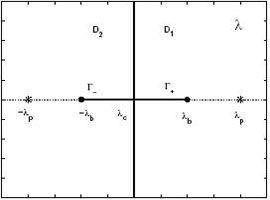| |
 Inverse scattering transform is a method to solve the initial-value problem for nonlinear partial differential
equations by means of linear spectral problems. Existence and uniqueness of solutions of nonlinear equations
are considered with the spectral and complex analysis. Spectral decompositions theorems are proven in Hilbert
and non-Hilbert spaces, associated with the self-adjoint and non-self-adjoint Lax operators.
Inverse scattering transform is a method to solve the initial-value problem for nonlinear partial differential
equations by means of linear spectral problems. Existence and uniqueness of solutions of nonlinear equations
are considered with the spectral and complex analysis. Spectral decompositions theorems are proven in Hilbert
and non-Hilbert spaces, associated with the self-adjoint and non-self-adjoint Lax operators.
Nonlinear evolution equations often exhibit localized solutions called algebraic solitons or lumps. The algebraic
solitons become non-integrable potentials in the fundamental spectral problems, such as the time-dependent Schrodinger
equation, the Dirac equation and the Ablowitz-Kaup-Newell-Segur system.
Analytical properties of non-Hilbert spectral problems, associated with the algebraically decaying potentials
are studied with the Riemann-Hilbert problem, the d-bar problem, and the Evans function formalism. Bifurcations
of embedded eigenvalues, resonances, and other deformations of the spectral data are considered in view of
applications to the nonlinear integrable systems.
|
|